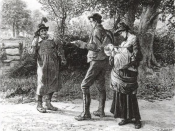The Return of the Native and The Mayor of Casterbridge both consist of plot twists, coincidences, and a series of minor and major climaxes. However, the time involved in the novels is very different. The Return of the Native may at first seem long because it contains many plot twists, but is it in fact very compact. The whole story takes place in only about a year. In contrast, The Mayor of Casterbridge takes place over a span of twenty years. In the movie, no great portion of time seems to be skipped over; not that it can be based on the fact that the entire duration is only a year. In the novel, Hardy deals with intervals of time in very interesting ways. At one point, he uses nine chapters to detail the events of only of a few days. This is in chapters three through eleven, a time that begins as Susan Henchard sets out to find Michael Henchard and ends as she meets him in the amphitheater.
During this small period, Hardy gives much detail as to how Susan and Elizabeth-Jane travel to Casterbridge, where they find the mayor and observe him. He also tells of Henchard's wooing of Farfrae and of his meeting first with Elizabeth-Jane and then with Susan. Hardy could easily have said all of this in one or two chapters, but he chose to drag it out like this. In much the same way, he could go through periods of many months in a single paragraph. He even bounds over a single period of twenty or so years and only lets the reader in on what happened as characters reflect on the past. Therefore, the feeling of time is very different in the movie than in the book.
The characters in each story all live in the same place. In The Mayor of Casterbridge, they all live in Casterbridge, and in The Return of the Native, they all live in Egdon Heath. The story never seems to venture outside Egdon Heath at all in the movie, while it does seem to do so a little in the book. They are alike, however, in the fact that the issues of the outside world do not intrude in the happenings of the story. The main characters in each tale, being from the same small towns, are tightly wound together in a tangle of many relationships. We must notice also, that in each story, our concentration upon the major characters is broken by the appearance of the poorer country folk, as if for comic relief, to recap the happenings of an event that had just occurred, much like a Greek chorus.
I know The Mayor of Casterbridge to be a serialized novel and The Return of the Native seems to be as well. Each seems to be arranged in an episodic sequence. Hardy puts enough suspense at the end of each episode to make the reader want to read the next episode. In The Mayor of Casterbridge, each episode develops an important part of Henchard's downfall. Each episode in The Return of the Native forms a significant step towards the tragedy that takes place in the end.
Henchard's journey through the novel can basically be seen with a few separate tragedies that make up his steady undoing until his death. The first episode in The Mayor of Casterbridge ends in Henchard loosing his family, a great mistake which he will never fully overcome. This event acts as the inciting incident which triggers all of his misfortunes to come. After the return of his wife and her subsequent death, he learns the truth about Elizabeth-Jane's parentage and that he is not her real father. In the following plot sequence, his secret from the first episode is revealed and he loses Lucetta to Farfrae and his status begins to dwindle. Consequently, he loses his business, house, and his furniture to his friend turned nemesis. Then, upon the arrival of Newson, he fears that he is going to lose Elizabeth-Jane, who is all he has left. During the final segment, he loses his daughter and dies lonely and unremembered, not knowing that his daughter forgave him.
Much in the same way, The Return of the Native had many parts that led up to the culminating catastrophe. The first scene that we see involves several women conversing about how Eustacia Vye has put a spell over the men of the town. It is shown immediately that she is an outcast and is hated by the women of the town because of her powers over men. The viewer can see right away that she will cause great conflict in the course of the story and will most likely be a major part of the tragedy. The next portion of the story brings Clym Yeobright home. Eustacia has been plotting to charm him for some time and when he meets her, he falls in love with her at first sight. This is the inciting incident in the movie that leads to all further tragedy. Clym's mother, being one of the women who dislikes Eustacia greatly, is upset with her son, thinking Eustacia has put a spell on him, and ultimately throws Clym out of her house. Further, Eustacia begins to have relations with Damon Wildeve. All of these events lead to Mrs. Yeobright's death as she sees Eustacia with Wildeve and collapses from the sadness of witnessing this. In the following episode, Clym hears that his mother died after being turned away from his home and seeing Eustacia with another man. He leaves her after this and causes her great pain. So much pain that she attempts suicide. Clym and Wildeve try in vain to save her, but they can not and Eustacia dies before Clym could tell her of his love for her.
In both stories, we see Hardy's use of several tragic climaxes to create a steady spiral downward. Many of these climaxes come about by interesting coincidences that occur. We must decide whether they are in fact coincidences, or whether they come from the realm of fate. Perhaps what seem coincidences in one's life, and many coincidence's plague Henchard and the characters of The Return of the Native, are actually incidents controlled by an unknown, and often ruthless, external phenomena.
We also see another striking similarity between the two stories. At the end of The Mayor of Casterbridge, Henchard dies before Elizabeth-Jane can find him and express her love and forgiveness. In The Return of the Native, Eustacia kills herself before Clym can reach her and exhibit his love and forgiveness. These endings only make the plot more tragic as the reader is left to say, "What if Elizabeth-Jane could have reached Henchard a little bit sooner," and, "What if Clym had not waited so long before going back to Eustacia." The only difference in the endings is that The Return of the Native has somewhat of an epilogue where Thomasin and Diggery are happily married and Clym remembers Eustacia happily and becomes a teacher of some kind. Perhaps this is only the beginning of another spiraling tragedy. We must be left to wonder.






